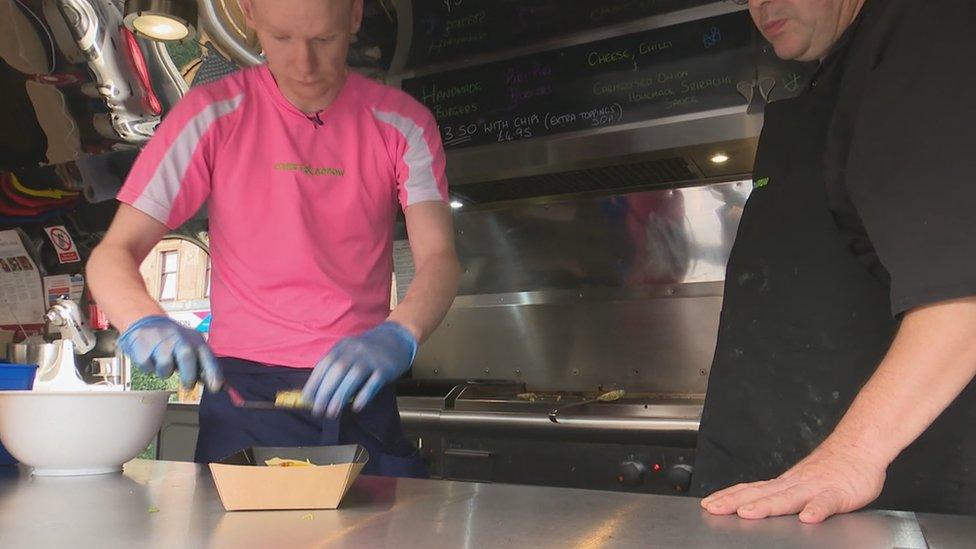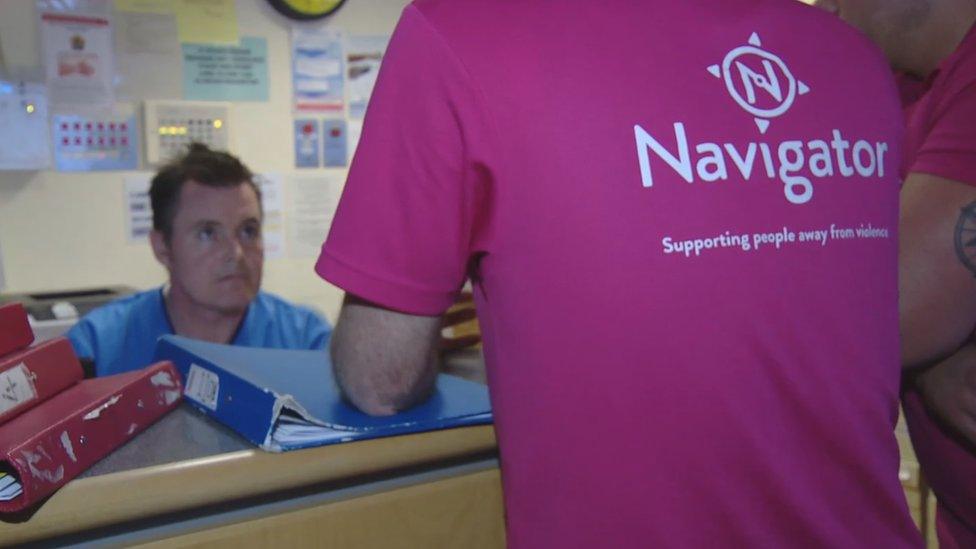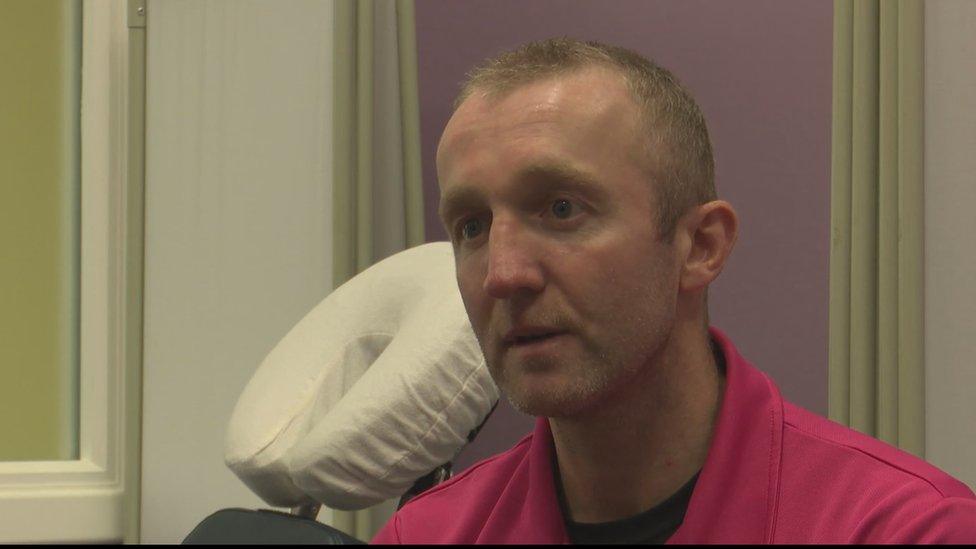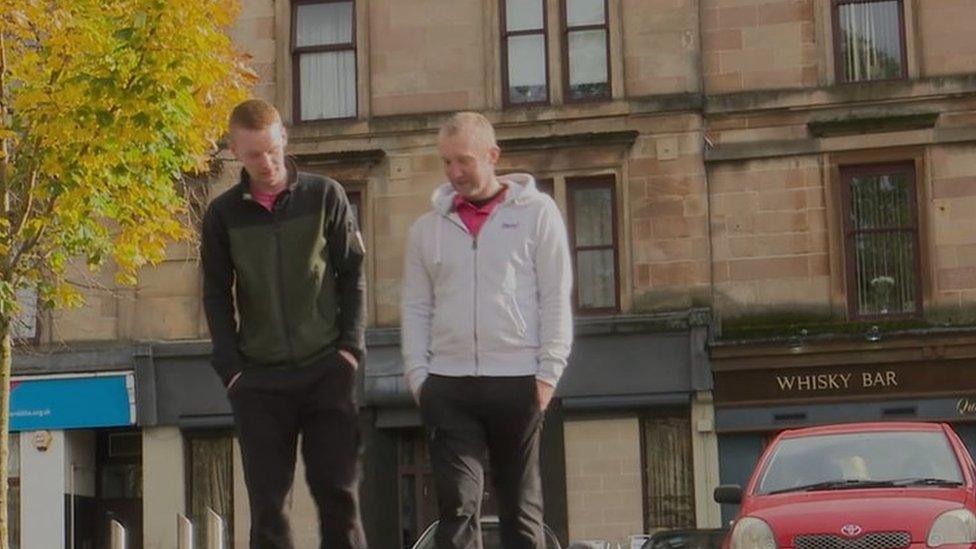Left for dead - then helped to quit gang life
- Published
The anti-violence project aims to steer people away from destructive lifestyles.
In the past nine months, Callum's life has changed almost beyond recognition.
At the start of the year, he was a long-term casualty of Glasgow's gang culture, heavily dependent on drink and drugs, frightened to leave his home for fear of revenge attacks.
Now he's a trainee chef, earning enough money to look after his young family and he hasn't had a drink for months.

Callum is now working as a trainee chef
The 26-year-old's transformation has happened because of a pilot project called Navigators which aims to identify victims and perpetrators of violence and offer them an escape route.
Stabbed in the back
Callum's darkest hour was in January when he was returning to his home in Ruchazie on the northside of Glasgow.
As he was approaching his front door, he was stabbed nine times in the back.
One of the blows put a 15mm hole in his kidney.
Another was a hair's breadth from his spine.
He was also struck on the head with a machete.
It's a night he and his family will never forget.
Navigator team
Callum says: "I was left for dead.
"My son was at my window and he seen the full thing at seven years of age.
"And this was just another day in the life for me.
"I'd been in and out of hospital 17 times in 10 years with knife injuries to myself through this lifestyle. But I knew then that I'd had enough."
After he was admitted to accident and emergency at Glasgow Royal Infirmary, he was approached by two people wearing pink t-shirts.

Callum remembers the pink shirt of the Navigators when he was in hospital
They were Sam Fingland and Alan Gilmour, the Navigator team based in the department.
Callum says: "Obviously I was under the influence and I'd lost a lot of blood as well.
"I could just remember the pink t-shirt that they were wearing.
"I knew they weren't police and I knew they weren't nurses or doctors and so they kind of stuck in my mind, who were they?
"I can always remember Alan said to me, 'if you don't want to live this lifestyle anymore you don't have to, and then, I can help you', and that stuck in my mind."

Alan Gilmour says you can only help people who positively want to change
Callum didn't know it then but he was at the start of a process by which the Navigators would help him understand his situation and how to escape it.
They pointed him in the direction of the agencies which would be able to support him but they let him make his own decisions about how to turn his life around.
Alan explains that they can only help people who positively want to make a change.
He says: "The whole essence of being in the hospital is being there at that reachable moment, where people could be contemplating their life maybe not going the way they want it to be going.
"So at that opportunity we say, 'it doesn't have to be like this, there are other things you can do with your life'.
"So we offered that to Callum at the intervention in the emergency department and just asked him, 'are you finished?'."
As it turned out, Callum was finished with that part of his life.

Callum says the Navigators have changed his life
But a new phase was just beginning.
He believes the Navigators saved him that night and gave him a chance to try to have a life worth living.
'Structure in my life'
Callum says: "I'm nine months sober today.
"I've no had any alcohol or any other substances for nine months, not committed any crimes for over a year and a half.
"I've not been in A&E, fortunately enough.
"Basically I spend my time when I'm not in work I'm at recovery and I'm with my children.
"That's where it's amazing for me.
"The best part of life is spending it with my kids, because now I can be a father to them which is all down to having structure in my life.
"People say it's being the person I was always meant to be."
Interim report
The Navigator project has now been running for almost two years.
It operates at the Royal Infirmaries in Glasgow and Edinburgh with just four permanent staff.
They have helped about 500 people.
An interim report details how the project has evolved so far but doesn't try to assess how effective it is or whether it represents value for money.
However, it does appear to have the potential to achieve substantial savings, if individuals are no longer being treated by the NHS or processed through the criminal justice system.
One head injury costs £34,000.
A year in prison costs about the same amount.
The annual cost of a Navigator, including salary and all other expenses, is about £30,000.
Scotland's justice secretary, Michael Matheson, has taken a keen interest but hasn't made any promises about the long-term future.
At the moment its funding is authorised on a yearly basis.
Callum Hutchison for one will be hoping the scheme thrives and grows, not just because he believes it saved his life, but also because his ambition now is to become a Navigator himself.